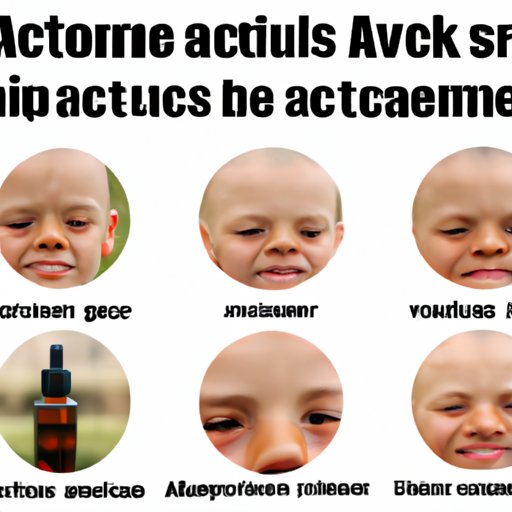Introduction
Acne is a common skin condition that can cause physical pain and embarrassment. While it is often thought of as a teenage problem, acne can occur at any age. Unfortunately, the resulting scars can last much longer than the active acne itself. This article will explore the science behind acne scarring, natural remedies to reduce the length of acne scars, different types of acne scarring and how long they last, the role of diet in reducing the duration of acne scarring, the impact of genetics on acne scarring, dermatological treatments for shortening acne scarring, and best practices for avoiding long-lasting acne scars.

Examining the Science Behind Acne Scarring and Its Duration
Before exploring the various remedies and treatments available for reducing the duration of acne scarring, it is important to understand how acne scars form. When an area of the skin becomes inflamed due to acne, the body responds by producing collagen to repair the damaged tissue. However, this process can sometimes result in the formation of an indented or raised area on the skin.
There are several factors that influence the duration of acne scarring. The type of acne and its severity are important considerations. For example, cystic acne, which is characterized by large, deep nodules, can cause more severe scarring. In addition, the patient’s age and skin type can also affect the length of time it takes for scars to fade.
Exploring Natural Remedies to Reduce the Length of Acne Scars
There are several natural remedies that can be used to reduce the length of time it takes for acne scars to fade. Honey and lemon masks are popular treatments for acne scars, as both honey and lemon have antibacterial properties that can help speed up healing. Tea tree oil is another popular option, as it can help reduce inflammation and promote skin cell regeneration. Aloe vera is also known for its healing properties, as it can help reduce redness and swelling associated with acne.

A Guide to Different Types of Acne Scarring and How Long They Last
There are four main types of acne scars: ice pick scars, boxcar scars, rolling scars, and hypertrophic scars. Ice pick scars are narrow, V-shaped depressions in the skin, and can take months or even years to fully fade. Boxcar scars are wider, angular depressions, and usually take around 6-12 months to fade. Rolling scars are wide, shallow depressions in the skin, and may take up to 18 months to fade. Hypertrophic scars are raised, thickened areas of skin, and may take up to a year or more to fade.

The Role of Diet in Reducing the Duration of Acne Scarring
Diet can play an important role in reducing the duration of acne scarring. Eating foods that are rich in antioxidants, such as fruits and vegetables, can help reduce inflammation and promote skin healing. Omega-3 fatty acids, found in fish and nuts, can also help reduce inflammation. It is also important to avoid certain foods, such as processed foods and dairy, as these can trigger inflammation.
Understanding the Impact of Genetics on Acne Scarring
Genetics can also play a role in the duration of acne scarring. People with certain genetic predispositions may be more prone to developing severe acne and more pronounced scars. However, there are steps that can be taken to minimize the impact of genetics on acne scarring. Using gentle skincare products, wearing sunscreen, and eating a balanced diet can all help reduce the risk of developing severe acne and long-lasting scars.
Dermatological Treatments for Shortening Acne Scarring
In addition to natural remedies and lifestyle changes, there are several dermatological treatments that can be used to reduce the duration of acne scarring. Laser treatments can be used to reduce the appearance of scars, while microdermabrasion and chemical peels can also help reduce the visibility of scars. It is important to note that these treatments may not be suitable for everyone, so it is important to speak to a dermatologist before undergoing any treatment.
Best Practices for Avoiding Long-Lasting Acne Scars
Finally, the best practice for avoiding long-lasting acne scars is to take preventative measures. Cleanse the skin regularly, use gentle skincare products, wear sunscreen, and eat a balanced diet. These steps can help reduce the risk of developing severe acne and long-lasting scars.
Conclusion
In conclusion, acne scarring can be a source of physical pain and embarrassment. While it is impossible to completely prevent acne scarring, understanding the science behind it and taking preventative measures can help reduce the length of time it takes for scars to fade. Natural remedies, dietary changes, and dermatological treatments can also help reduce the duration of acne scarring.


